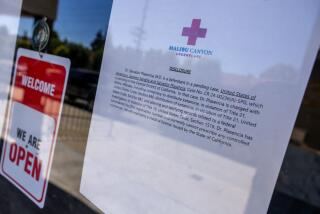Probation Urged for Doctor : Courts: Judge says physician whose girlfriend died from cocaine he supplied should not lose license.
- Share via
A judge has recommended six years of probation for a Sherman Oaks emergency-room doctor who admitted abusing drugs for 20 years and supplying cocaine to a girlfriend who died of a massive overdose.
The Medical Board of California had sought to revoke or suspend Dr. Stanley Azen’s physician’s license, charging him with gross negligence in the death of Donna Lynn Miller, 28. She suffered seizures and died at Azen’s $400,000 former Westside home after they took cocaine together in 1990.
In a written opinion made public Friday, state Administrative Law Judge Richard E. Ranger said although Azen failed to get treatment after he became addicted to drugs and improperly tried to revive Miller by himself, he should not lose his license.
Ranger said there was no evidence Azen, 43, was impaired by drugs when he performed cardiopulmonary resuscitation on Miller or that he “intentionally permitted Donna to die.” The judge said Azen passed numerous random drug tests while on probation for a 1991 cocaine-possession conviction and no longer uses illicit drugs.
Ranger’s recommendation still must be reviewed by the state medical board, which usually ratifies a judge’s opinion in such cases, a board spokeswoman said.
Ranger’s recommended discipline contrasted with the punishment meted out to Azen last year by the U. S. Drug Enforcement Administration, which revoked his permit to prescribe pain-killing narcotics, triggering his dismissal from Pacifica Hospital of the Valley in Sun Valley. DEA permits are considered crucial for emergency-room physicians.
Azen’s attorney, Robert Beswick, was delighted with Ranger’s recommendation.
“No downtime is amazing,” he said. “I thought they’d get him for at least six months” of suspension. The deputy state attorney general who prosecuted Azen, Robert McKim Bell, declined comment.
*
Azen worked for 10 years in the emergency room at the Medical Center of North Hollywood and later was employed for three years as an ER physician at Pacifica.
Despite his legal problems, Azen won high praise from several physicians he has worked with. They described him as an excellent doctor who was deeply committed to caring for low-income patients.
Ranger’s 15-page opinion, however, made no mention of those accolades. The judge concluded simply that “the public interest would not be disserved” by placing Azen on probation and allowing him to prescribe narcotics only in a hospital.
In legal hearings, Azen admitted he began experimenting with cocaine and marijuana in the 1970s and became “a regular cocaine user” in the 1980s, spending up to $2,000 per month on the drug.
Azen said he never used cocaine while on duty. But a longtime friend told state investigators the physician had “a high tolerance” for cocaine and used it to stay awake at work. In 1987, Azen was working up to 90 hours a week at the North Hollywood hospital, earning $240,000 a year.
After Miller moved in with him, Azen’s former Westside house became a gathering spot for their friends, who often barbecued, played volleyball and used drugs together for days on end, Azen testified.
Azen described Miller as a drug addict and alcoholic. Although she was working as a medical auditor when they met, the physician said she was unemployed and “dysfunctional” just prior to her death.
After having drinks, taking cocaine and having sex with Azen on the night of Sept. 20, 1990, Miller suffered two seizures in bed. Azen said he performed CPR but could not revive her. Cocaine can induce seizures.
Miller died of a cocaine overdose, and experts testified that her body contained four times a fatal dose of cocaine.
*
Azen said she had only “one or two lines” of cocaine with him that night, and Ranger said it was unclear how such a large amount of cocaine entered her system. But the judge noted that Miller, without Azen’s knowledge, had acquired a key to the home safe where the doctor stored his cocaine.
After Miller’s second seizure, Azen said he performed CPR for 30 minutes before calling paramedics. Ranger said Azen was guilty of gross negligence for not summoning emergency help earlier.
Several months after Miller’s death, Azen was arrested by Los Angeles police for allegedly selling cocaine to Miller’s sister Debbie. He later was convicted of possessing cocaine and sentenced to three years of probation, including 180 days in jail and a $50 fine.
Azen said that following his arrest, he decided to kick his drug habit and entered a Los Angeles outpatient clinic of the Betty Ford Center. He underwent counseling and passed 38 random drug tests. He said he has not used illicit drugs in three years.
After he was convicted of cocaine possession, Azen’s Westside home and Jeep Cherokee were seized under federal anti-drug asset-forfeiture laws. The Jeep was later returned.
In revoking Azen’s license to prescribe narcotics, the Drug Enforcement Administration said in a written decision that it was “inconsistent with the public interest” for him to keep his certificate, given his long history of drug abuse. Azen has appealed to the U. S. Supreme Court.
Although the permit was revoked March 3, Azen continued to work at Pacifica without it until May 15, when questions about the permit led to his dismissal.
*
Azen said patients were never affected because he was able to get controlled drugs from the hospital pharmacy, which has its own DEA certificate.
More to Read
Sign up for Essential California
The most important California stories and recommendations in your inbox every morning.
You may occasionally receive promotional content from the Los Angeles Times.












